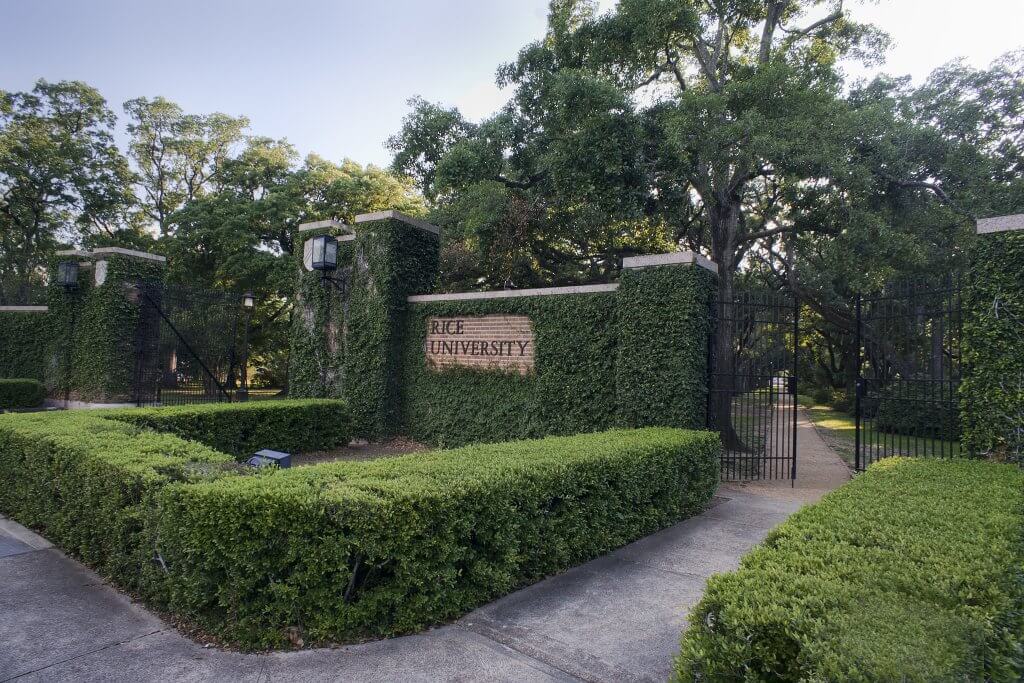Editor’s Note: Alumni of Rice University Students for Justice in Palestine are circulating the following letter in response to the university suppressing a campus vote on divesting from “corporations complicit in the ongoing genocide in Gaza.” To add your name, sign here.
On Monday, March 25, members of the Rice University Student Association introduced Senate Resolution No. 02, titled “Student Association Boycott and Divestment from Corporations Complicit in the Ongoing Genocide in Gaza.” Following an anonymous discrimination complaint, Dr. Richard Baker made an executive decision under Policy 830 to indefinitely table the student vote on S.RES 02, enforced by Dean of Undergraduates Bridget Gorman.
We are a group of concerned alumni representing perspectives across race, ethnicity, age, political affiliation, and faith tradition. We are former Student Association senators, college presidents, and committee members. We are Jewish, we are BIPOC, we are immigrants, and we are the descendants of immigrants. We are committed to living up to our shared values of responsibility and integrity, values nurtured by our Rice educations, and so, we write to denounce Rice University’s violation of its students’ agency and freedom of expression.
S.RES 02 proposes extensive modifications to policies governing the Student Association and its financial administration to align more closely with principles of human rights and justice. One proposed change establishes an ethical spending advisory board to prevent the allocation of blanket tax funds to corporations profiting off of the apartheid. S.RES 02 also calls upon Rice University and the Rice Management Company to end institutional complicity in genocide, fulfilling a small portion of the enormous responsibility we have to the Palestinian people as fully developed global citizens—a responsibility that our Rice educations have encouraged us to uphold.
Having been provided no explanation of “discrimination” created by S.RES 02, we understand the suppression of the vote and deliberate ambiguity in administrative proceedings as efforts to silence and misrepresent organized student advocacy for justice.
Rice administration is also setting a dangerous precedent for its relationship with the student body. It ignores the full language of Policy 830, which affirms that the University’s discrimination and harassment policies are “not intended to impede an individual’s ability to engage in lawful speech, even if controversial.” However, blocking the Senate vote on S.RES. 02 directly impedes students’ ability to engage in lawful speech amidst increasing student censorship at peer institutions across the United States and scholasticide in Gaza. As pro-Palestine students have already been subjected to unjust disciplinary hearings over the past several months, we cannot understand Rice administration’s no-vote order as anything but the continuation of a coordinated attack on their rights.
The administration is also violating Policy 820, which specifies that one of the University’s functions is to “provide its community of students, faculty and staff members a forum for the safe, non-disruptive expression and discussion of diverse points of view, even when those expressions or discussions are controversial.” Rice’s disregard of this policy is especially troubling in the context of escalated incidents of stalking, harassment, and violent threats endured by Pro-Palestine students from community members on and off campus.
Two of several text messages from unknown senders received by Rice student Neha Kohli following the introduction of S.RES 02
Lastly, we are seeing Rice mirror statewide voter suppression. The crackdown on students voicing support for Palestine disproportionately impacts Black, Indigenous, and other students of color, just as legislation such as Senate Bill 1 disenfranchises voters, particularly voters of color.
As alumni of Rice University, and current and potential donors, we refuse to remain silent. We maintain that the decision to block the vote on S.RES 02 is a clear violation of students’ ability to democratically assemble and hold a vote. These actions undermine Rice’s integrity as an institution that encourages a “high level of student self-governance” and seeks to “empower students at Rice to develop into leaders and to take actions that positively benefit the world.”
Therefore, we affirm the demands of undergraduate students to proceed with a vote on S.RES 02 and restore democratic processes in the Rice University Student Association, whose traditions of student advocacy and governance have persisted for over a century.
We also echo the demands of current students in calling on Rice University to:
- Abstain from interfering with democratic student voting processes now and in the future
- Protect the rights, safety, and well-being of pro-Palestine students at Rice through concrete action
Initial Signatories:
- Doha Aboul-Fotouh, MD, Wiess ‘15
- Seja Abudiab, McMurtry ‘13
- Batoul Abuharb OD, Martel ‘12
- Zubaidat Agboola, Wiess ’21/Rice ‘22
- Ozen Ahmed, Jones Graduate School of Business ‘10
- Raidah Ahmed, Baker ‘21
- Hafsa Ahsan, Jones ‘23
- Avanthi Ajjarapu, Duncan ‘15
- Steven Ajluni, Wiess ‘16
- Riya Albert, Baker ‘21
- Sarah Ali, Martel ‘14
- Mohammad Alsheikh-Kassim, Martel ‘16
- Diana Alvarado, Wiess ‘23
- Alizay Azeem, Wiess ‘23
- Iyza Baig, Sid Rich ‘15
- Sarah Bakhiet, Duncan ‘15
- Komal Bansal, Jones ‘15
- Steven Boswell, Jones College President 2011-12
- Elizabeth Brossa, Hanszen ‘03
- Hayley Brown, Baker, ‘13
- Zahrah Butler, Duncan ‘23
- Alyssa Cahoy, Sid Richardson ‘23, former staff
- Jazmine Castillo, McMurtry ‘23
- Shannon Cheng, Wiess College Senator 2013-14
- Nicole Chun, Brown ‘15
- Roberto Cofresi, Sid Richardson ‘88
- Kamil Cook, Brown College Senator 2019-20
- Nick Cooper, Wiess ‘91
- Rebecca Curtis, McMurtry ‘15
- Iqra Dada, Duncan ‘18
- Diego Degenhart, Wiess ‘22
- Saoirse Disney-McKeethen, Baker ’23
- Michael Drewry, McMurtry ‘15
- Clay Embry, Hanszen ‘91
- Owais Fazal, Lovett ‘21
- Jennifer Fu, Duncan ‘20
- Saniya Gayake, Baker ‘21
- Annelise Goldman, McMurtry ’22
- Nadia Haj-Ismail, McMurtry ‘13
- Ashley Hamm, Brown ‘06
- Mariam Hussain, Brown ‘16
- Ibrahim Ibrahim, MD, Martel ‘03
- Jahnavi Jagannath, Lovett ‘18
- Dayae Jeong, McMurtry ‘15
- Aurora Kesler, Brown ‘23, current staff
- Radina Khalid, Brown ‘16
- Dahyeon Kim, Lovett ‘14
- Seung Hye Kim, McMurtry ‘20
- Daniel Koh, Jones College Senator 2017-18
- Sneha Kohirkar, McMurtry ‘15, former staff
- Mark Williams Laforest, Jones ‘20
- Erik Leidal, Sid Richardson ‘94
- Soso Leung-Wolf, Wiess ‘19
- Hattie Amelia Lindell, Duncan ‘21
- Kaitlyn Liu, Wiess ‘23
- Missy Lucas, Jones ‘1414
- Ian Morell, Wiess ‘16
- Lana Murad, Jones ‘23
- Joanna Nelson Cheung, Baker ‘93
- Jeffrey Nunnally, Sid Richardson, ‘88
- Sam Olvera, Jones ‘15
- Vinay Pattalachinti, Wiess ‘23
- Shifa Rahman, Lovett ‘22
- Anna Rajagopal, Jones ‘23
- Sevita Rama, Jones ‘15
- Bilal Rehman, Duncan ‘20
- Soha Rizvi, Hanszen ‘22
- Dan Robinson, Wiess ‘92
- Alexis Rosseett-Robertson, Sid Richardson ‘23
- Gargi Samarth, Brown College Senator 2020-21
- Sahar Sawani, Martel ‘16
- Bridget Schilling, Lovett ‘17
- Lily Sethre-Brink ‘23, Student Association External Vice President 2021-22
- Tsedenia Tewodros, Sid Richardson ‘14
- Hannah Thalenberg, McMurtry ‘12
- Benjamin Thomas, Duncan ‘23
- Mai Ton, Baker ‘21
- Elizabeth Urban, Baker, ‘04
- Divine Weber, Duncan College Senator 2019-20
- Bria Weisz, Brown ‘23
- Mya Wilkes, McMurtry ‘15
- Ashley Wu, Wiess ‘23
- Abraham Younes, Will Rice ‘16
- Lillian Zhang, Lovett ‘23
- Lynn Zhu, Sid Richardson ‘19



Jewish students who feel threatened by the perceived rise of anti-Semitism on campus need to realize that the current rise in anti-Zionism is NOT anti-Semitism. They are told that by the ADL to scare them into supporting Zionism, no matter what crimes the Zionists commit.
Such use of fear is typical of cult leaders. Other standard tactics are to tell cult members they are special in some way, and they must preserve their specialness by marrying only other cult members, and by living among other cult members. Sound familiar?